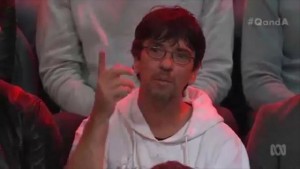Home » Commentary » Opinion » Bad parenting is the real dysfunction
· The Australian

 The deeper significance of the row over Duncan Storrar’s appearance on Q&A concerns the real causes and true nature of social disadvantage.
The deeper significance of the row over Duncan Storrar’s appearance on Q&A concerns the real causes and true nature of social disadvantage.
Storrar’s unwarranted status on the Left as a national hero in the fight against social inequality tells us something we already know. The Q&A program will parade before a national audience whatever members of the general public it can find – be they an Islamist-sympathiser from Western Sydney or a supposedly ‘struggling battler’ from Geelong – who can put a human face on the ABC’s ideological agenda.
The question Storrar was loaded up to ask on Monday night was meant to prove the kindergarten-Marxist explanation for poverty preferred by assorted social justice warriors across the welfare lobby. That explanation is that poverty is a structural feature of a fundamentally unjust society in which the game is rigged by the ‘rich’ – wealthy elites get tax breaks while the downtrodden are ‘punished’ by losing their welfare benefits if they choose to work.
Just why someone who can work to support themselves should expect to stay on welfare and continue to be entitled to receive other people’s money was not canvassed on Q&A. Moreover, the entire premise of Storrar’s gotcha question was flawed when the distributional effects of the tax and transfer system are considered. The reality is that a minority of people — the higher income-earners — are the only ones paying net tax to fund the generous benefits and services received by the majority of non-taxpaying members of the community.
Nevertheless, the social justice warriors argue that the only way to alleviate poverty is to have even more re-distribution – squeeze the pips out of the rich even harder and give greater amounts to the poor
Critics on the other side of the debate — on the conservative side of the so-called ‘poverty wars’ – maintain that greater re-distribution will fail to make society more equal because economic inequality is not the chief cause of social disadvantage.
The real explanation for poverty is that different social outcomes reflect the different behaviours of different groups in society. Social disparities are explained by the fact that those on the higher rungs of society have internalised the set of social norms around education, work, and family life that are the building blocks of success and prosperity, as compared to many of those on the lowest rungs of society.
Herein lies the significance of the follow-up reporting by The Australian. Caroline Overington’s story quoting Storrar’s son delivered many killer blows to the ‘social injustice causes poverty’ thesis.
While the Q&A producers might be a soft touch when it comes to sob stories about people being poor through no fault of their own, Storrar’s son, Aztec Major, is made of sterner stuff, and says his father is undeserving of the support and sympathy he has received. His father is not the helpless and innocent victim of impersonal social forces he has been made out to be, because he has been the author of his own fate due to his bad behavior.
Storrar’s apparent history of drug abuse – and bad influence over his teenage son who also became hooked – appears to be the tip of a bigger story of personal dysfunction involving multiple broken relationships, abandoned children, and hints of domestic violence. His son, by contrast, is the real hero, who has overcome his troubled and chaotic childhood, earned himself an apprenticeship, and got his act together in general so “I keep myself out of trouble.”
The real story here is a tragically familiar one when it comes to explaining the rise of an underclass in Australia. This refers to the growing number of families who are long-term welfare-dependent, and display a range of behavioural dysfunctions — the most common being serious drug- and alcohol-abuse problems. The dysfunction extends to the breakdown of the basics of family life and the proper care of children.
What is happening in these families is that the behavioural poverty of underclass parents perpetuates the dysfunction by way of poor parenting and role-modelling. This produces the situation where, for many members of the underclass, disadvantage is ‘inherited’ – an intergenerational problem passed on because dysfunctional parents damage their children.
This is the social reality that is increasing social inequality in Australia. But this was not a story that Q&A was prepared to tell. Instead, the program preferred to exploit Storrar as a convenient piece of agitprop to promote deeply misleading myths about social disadvantage.
Jeremy Sammut is a Senior Research Fellow at The Centre for Independent Studies and author of The Madness of Australian Child Protection.
Bad parenting is the real dysfunction